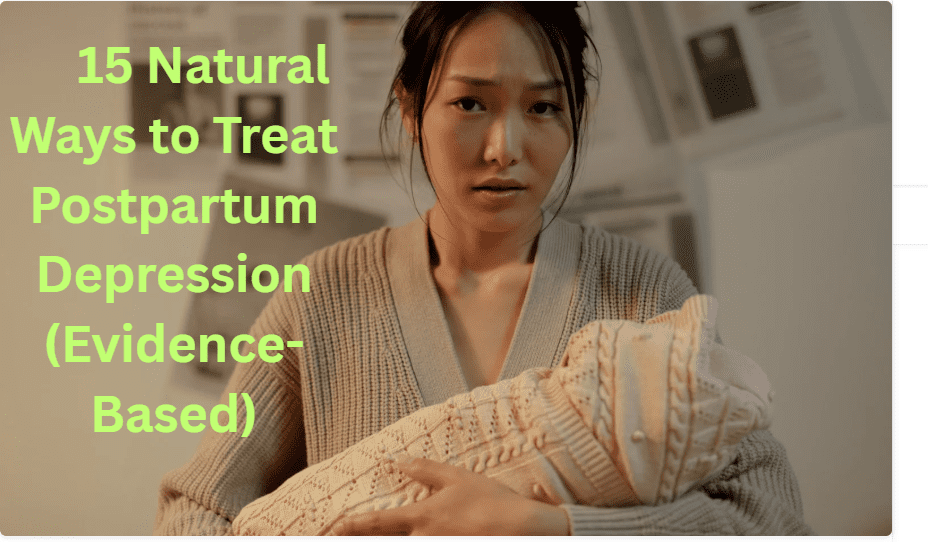Final Thoughts
Postpartum depression is a common and serious condition, but there are many natural, evidence-based strategies that can help. From social support and mindfulness to nutrition and physical activity, these approaches can be used alone or alongside conventional treatments. Always consult with a healthcare provider before starting any new treatment, especially during the postpartum period.
If you or someone you know is struggling with postpartum depression, reach out to a healthcare professional or support group. You are not alone, and help is available.
You May also like: The Ultimate Guide to Cardio for Weight Loss|Transform Your Body Fast
Frequently Asked Questions
Q: Are natural treatments enough for severe postpartum depression?
A: While natural treatments can be helpful, severe cases of PPD may require professional intervention, including therapy and medication. Always consult a healthcare provider.
Q: Can I use herbal supplements while breastfeeding?
A: Some herbal supplements may not be safe during breastfeeding. Always consult your doctor before starting any new supplement.
This article is for informational purposes only and does not substitute professional medical advice. If you are experiencing symptoms of postpartum depression, please consult a healthcare provider.
References
- Dennis, C.-L., & Falah-Hassani, K. (2019). Prevalence of antenatal and postnatal anxiety: systematic review and meta-analysis. British Journal of Psychiatry, 214(6), 315-323. https://www.ncbi.nlm.nih.gov/pmc/articles/PMC6469458/
- Hofmann, S. G., Sawyer, A. T., Witt, A. A., & Oh, D. (2010). The effect of mindfulness-based therapy on anxiety and depression: A meta-analytic review. Journal of Consulting and Clinical Psychology, 78(2), 169–183. https://www.ncbi.nlm.nih.gov/pmc/articles/PMC3679190/
- Kuyken, W., et al. (2016). Mindfulness-based cognitive therapy to prevent relapse in recurrent depression. Journal of Consulting and Clinical Psychology, 84(8), 700–713. https://www.ncbi.nlm.nih.gov/pmc/articles/PMC2848393/
- Daley, A. J., et al. (2019). Exercise for postpartum depression: A systematic review and meta-analysis. Journal of Affective Disorders, 243, 408-418. https://www.ncbi.nlm.nih.gov/pmc/articles/PMC6349036/
- Firth, J., et al. (2020). The effects of dietary improvement on symptoms of depression and anxiety: a meta-analysis of randomized controlled trials. Psychosomatic Medicine, 82(3), 265-280. https://www.ncbi.nlm.nih.gov/pmc/articles/PMC7071223/
- Freeman, M. P., et al. (2006). Omega-3 fatty acids: evidence basis for treatment and future research in psychiatry. Journal of Clinical Psychiatry, 67(12), 1954-1967. https://www.ncbi.nlm.nih.gov/pmc/articles/PMC533861/
- Anglin, R. E. S., et al. (2013). Vitamin D deficiency and depression in adults: systematic review and meta-analysis. British Journal of Psychiatry, 202(2), 100-107. https://www.ncbi.nlm.nih.gov/pmc/articles/PMC6213340/
- Papakostas, G. I. (2009). Folate and S-adenosylmethionine for major depressive disorder. The Psychiatric Clinics of North America, 32(1), 135-146. https://www.ncbi.nlm.nih.gov/pmc/articles/PMC3130627/
- Papakostas, G. I., et al. (2009). S-adenosylmethionine (SAMe) for major depressive disorder. CNS Drugs, 23(2), 133-142. https://www.ncbi.nlm.nih.gov/pmc/articles/PMC2654794/
- Golden, R. N., et al. (2005). The efficacy of light therapy in the treatment of mood disorders: a review and meta-analysis of the evidence. American Journal of Psychiatry, 162(4), 656-662. https://www.ncbi.nlm.nih.gov/pmc/articles/PMC2913518/
- Smith, C. A., et al. (2013). Acupuncture for depression. Cochrane Database of Systematic Reviews, (10). https://www.ncbi.nlm.nih.gov/pmc/articles/PMC3611646/
- Field, T. (2011). Massage therapy research review. Complementary Therapies in Clinical Practice, 17(1), 1-8. https://www.ncbi.nlm.nih.gov/pmc/articles/PMC3091423/
- Cramer, H., et al. (2013). Yoga for depression: a systematic review and meta-analysis. Depression and Anxiety, 30(11), 1068-1083. https://www.ncbi.nlm.nih.gov/pmc/articles/PMC3193654/
- Cooke, B., & Ernst, E. (2000). Aromatherapy: a systematic review. British Journal of General Practice, 50(455), 493-496. https://www.ncbi.nlm.nih.gov/pmc/articles/PMC3612440/
- Sarris, J., et al. (2011). Herbal medicine for depression, anxiety and insomnia: a review of psychopharmacology and clinical evidence. European Neuropsychopharmacology, 21(12), 841-860. https://www.ncbi.nlm.nih.gov/pmc/articles/PMC3130627/
